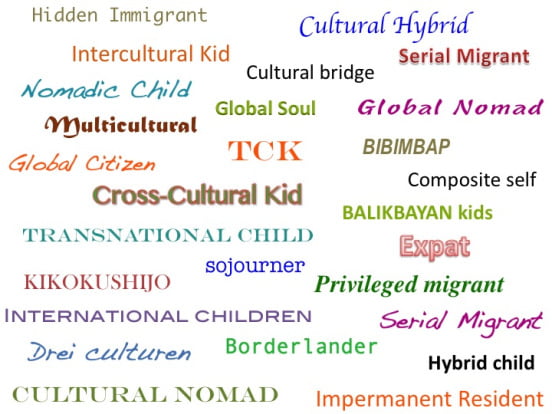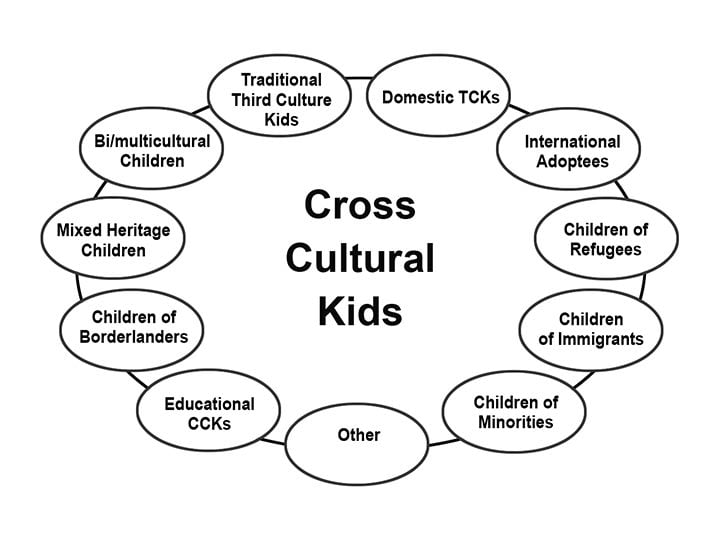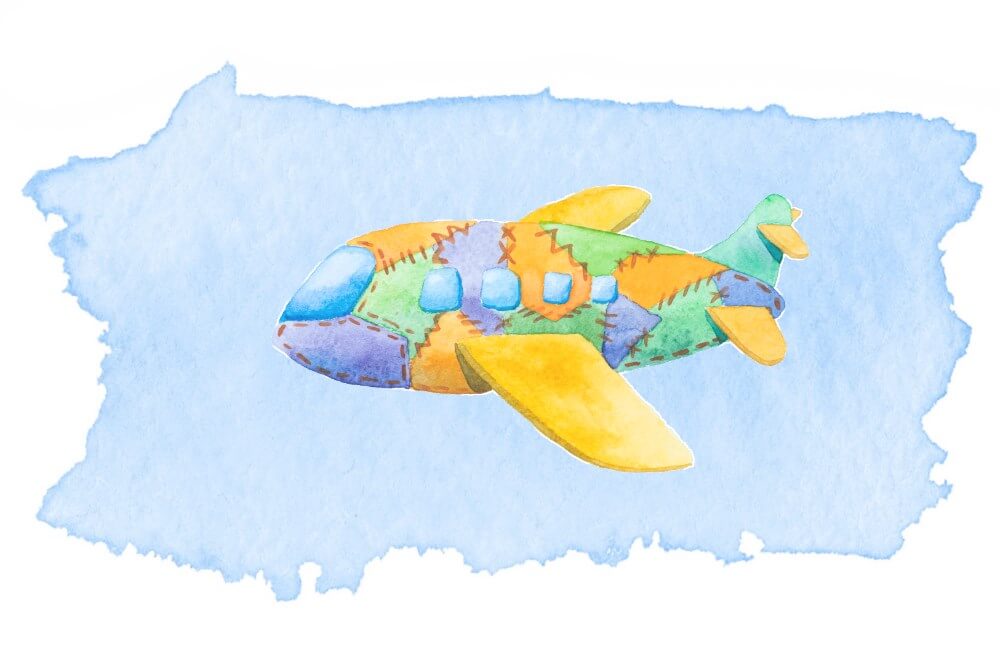By World Family Education
Growing up in a culture away from the one imprinted on one’s passport isn’t such a rare experience anymore. Globalization has transformed the lifestyle of numerous families today. Parents and children from many nationalities move to different cultures for a variety of reasons, such as:
Children who spend a significant amount of their developmental years in another culture are deeply impacted. They develop a unique worldview and learn to adapt as they move between cultures. Oftentimes they have difficulty establishing a cultural identity of their own. For these children, the question, “Where are you from?” is difficult to answer.
A variety of terms attempt to describe this experience and the resulting identity these children develop:

Prof. Ann Baker Cottrell from globallygrounded.com
Because each child’s situation is unique, some terms describe their identity and background more accurately than others. One of the earliest and most well-known phrases used to describe these children is “third culture kids” (TCKs). More recently, the term “cross cultural kids” has gained more acceptance as an inclusive description of the many cultural influences children can experience.
Third Culture Kids
The phrase “third culture kid” became especially popular after the release of the book Third Culture Kids: The Experience of Growing Up Among Worlds in 1999 by David Pollock and Ruth Van Reken.
In Pollock’s definition, a TCK is someone who has spent a significant part of their childhood outside of their parent’s culture. They coexist in multiple cultures, but don’t necessarily identify with or feel fully part of any of them. The “third culture” is not just a blend of these cultures, but rather a unique worldview that develops from the cross-cultural experience. This worldview has strong elements that are shared by all kids with similar cross cultural experiences, no matter what countries or cultures they experienced. TCKs identify with and feel like they belong with others that share this common worldview or culture.
Still, the idea that the “third culture” is a blend of cultures offers a useful model for explain the TCK experience. Tanya Crossman offers an interesting way of looking at what cultural elements are being blended in her article “The Three Cultures of a Third Culture Kid” at China Source.
A helpful short film that tells the story of TCKs is here:
The phrase “third culture kid” can be limiting when we take note of huge numbers children exposed to many varieties of cross-cultural influences.
Some of these children are exposed to multiple countries and cultures. Some have lived in one location for many years. Sometimes families themselves are made up of multiple cultures and languages due to cross-cultural adoption or because the mother and father each come from a different nationality while living in an altogether different culture. Even within an international school, children from multiple nationalities and ethnic groups come together to create a unique culture.

Cross Cultural Kids
“Cross cultural kids” (CCKs) is a newer phrase used by researcher Ruth Van Reken to better describe this unique group of people. This term expresses more broadly the experience of any children who accompany their parents across cultures (including traditional TCKs). Her chart (shown here) identifies the many different kinds of children that are considered CCKs.
Characteristics of a CCK
CCKs have great strengths. They are adaptable and flexible. Sometimes they are peacemakers and can bridge cultural gaps between peoples who don’t understand one another. They are relationally sensitive and concerned about world events. They often have special skills, such as speaking multiple languages.
But they also have struggles. Many have difficulty engaging in deeper relationships due to the number of times they have had to say goodbye and the grief they’ve experienced. They struggle adapting to their home culture and language and feel rootless. And they may have a difficult time feeling at home anywhere and having a sense of identity.
CCKs see the world differently and have unique needs, and it’s important that parents understand how living in another culture impacts their child and shapes their identity.
Check out the World Family Education listing of Transition Seminars & Support for globally mobile families — several organizations cater to the needs of TCKs.
More Resources and Information
Books
At World Family Education, explore Books About the Cross-Cultural Experience for Adults at World Family Education and how to navigate that well and support your children.
Also explore Books About the Cross-Cultural Experience for Kids and Teens at World Family Education. Included are both nonfiction and fiction, with stories about a wide variety of cultural experiences.
Online Resources & Articles
Cross Cultural Kids — The official site of Ruth van Reken, one of the authors of Third Culture Kids (2009), a landmark book defining the TCK experience. The site provides lots of information (articles, podcasts) about TCKs — which Ruth now refers to as cross-cultural kids (CCKs). A page at this site focuses completely on what it means to be a CCK.
Third Culture Kids: Citizens of everywhere and nowhere — A BBC article describing the experience of the TCK.
Who is a TCK? — Links to multiple pages about third culture kids and identity issues by the Summer Institute of Linguistics (SIL) organization. Also some links to books for cross-cultural issues. Site is temporarily offline.
TCK World: The Official Home of Third Culture Kids — The official site of Ruth Useem, originator of the phrase “third culture kids.” Links to research, resources, and community.
Cross-Cultural Kids: a different kind of TCKs? Great post from Piri-Piri Lexicon explaining why the term “third culture kid” doesn’t fit well for some children and defines “cross-cultural kids.”
The 10 biggest struggles for a third culture kid Article by The Telegraph outlining some difficulties for TCKs.
The fantastic gift of being a Third Culture Kid — Post by Third Culture Mama describes some of the reasons why being a TCK is an amazing experience.
Am I rootless, or am I free? ‘Third culture kids’ like me make it up as we go along — A personal story told in The Guardian about identity, belonging, and rootlessness as a TCK.
When cross-cultural kids are rejected by their own family — Another insightful post by Third Culture Mama (hosted by Multicultural Kid Blogs) that describes changes that take place in a TCK’s identity after living in another culture, and how friends and family in the home culture may not understand this shift.
For Third Culture Kids, Travel Is Home — A personal story shared in Condé Nast Traveller that portrays the restlessness, rootlessness, and unresolved grief that TCKs share and the bond that creates between them.
TCKCare: Soul Food for Global Nomads — A podcast for those with a multicultural childhood, past or present.
Online Community
Connect with communities of TCKs and CCKs online. Several niche groups for this community are online, with most catering to adults. Many of these can be found on social media platforms like Facebook, such as Cross Cultural Kids Everywhere (26,000+ followers), Third Culture Kids (TCKs) (16,000+ followers), and Third Culture Kids Everywhere (5,000+ followers).
TCKidNow — For adults and youth. Offers community and forums online as well as community in various cities for TCKs.
I Am a Triangle — Community for adult global nomads of all kinds — CCKs, expatriates, repatriates, etc.
International Association of Missionary Kids — Community for Christian missionary kids (MKs), adult MKs, parents of MKs. Site is produced by the Assemblies of God organization.
Foreign Service Youth Foundation — Dedicated to the support of children of employees of U.S. foreign affairs agencies. Helps young people adapt to changing environments as they transition between posts worldwide.
Brats Without Borders — Supports U.S. military “brats” and third culture kids of all ages.
Sources
Pollock, D. C., and Van Reken, R. E. (1999). Third Culture Kids: Growing Up Among Worlds. Yarmouth, ME: Intercultural Press.
Mayberry, K. (2016, November 18). Third Culture Kids: Citizens of everywhere and nowhere. Retrieved from http://www.bbc.com/capital/story/20161117-third-culture-kids-citizens-of-everywhere-and-nowhere


